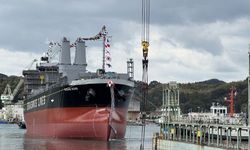The scale of Trump’s victory is being seen as a game-changer, one that will reshape not just trade dynamics but also the regulatory landscape for the shipping industry in the coming years.
At a victory rally in Florida, Trump declared, “This will forever be remembered as the day the American people regained control of their country.” For the shipping world, however, the focus is less on politics and more on what this means for global trade flows and geopolitical tensions between the world’s two largest economies.
Economic Realignment Looms
Shipping experts agree that the re-election of Trump signals a likely continuation of the trade war rhetoric and protectionist policies that dominated his first term. Martin Stopford, a prominent maritime economist, described the situation as part of a broader economic realignment between the Pacific and Atlantic economies that has been underway for over a decade. "Trump’s tariff wall might be just one stage of this process, but it will be difficult to achieve much in just four years," Stopford warned.
Khalid Hashim, Managing Director of Thailand's Precious Shipping, echoed these sentiments but offered a more optimistic view on shipping’s immediate future. He argued that while the rhetoric surrounding tariffs might appear alarming, it may not result in significant changes in shipping traffic. Hashim pointed out that US container imports had increased dramatically over the last eight years despite the ongoing trade war. "Look at the numbers from Los Angeles and Long Beach, the two largest US container terminals, showing continued growth in imports despite tariffs," he said.
Tariffs Could Hurt, But Rebuilding Ukraine May Offer Some Relief
The potential for further tariffs against China remains a significant concern for the global shipping industry. Roar Adland, global head of research at SSY, warned that higher tariffs on China could disrupt international seaborne trade and create challenges for shipping companies. “If other countries retaliate, international trade will suffer, which is bad for shipping,” he noted.
However, Adland did suggest that a quicker resolution to the war in Ukraine could offer an uptick in trade, particularly for cement and steel as the country rebuilds. This, he believes, could provide a temporary boost to certain sectors of the shipping industry.
Asia, US Relations: Volatile But Potentially Profitable
Punit Oza, a Singapore-based maritime consultant, provided a nuanced view, suggesting that while Trump’s policies may create volatility, they could also lead to new opportunities, particularly for Asia. "Fossil fuel production in the US will likely increase, and trade agreements will continue to be renegotiated, making trade flows more dynamic,” Oza said. He added that an improvement in trade relations between Asia and the US could result in longer ton-miles and two-way traffic, which would be beneficial for the shipping industry.
However, Peter Sand, Chief Analyst at Xeneta, warned that Trump’s policies could push shipping into a more unpredictable future. “As shipping is a global industry, the geopolitical risks tied to Trump’s return will be felt across the board. Companies will need to brace for volatility,” he said.
Decarbonization Efforts at Risk
One of the more concerning aspects of a second Trump term for the shipping industry is the potential setback for global decarbonization efforts. Analysts from Sea-Intelligence warned that if Trump follows through with his administration's deregulatory approach, it could stymie progress at the International Maritime Organization (IMO), which has been working on global regulations to decarbonize shipping. “New regulations and targets may hit a dead end,” they cautioned.
However, Anais Rios, Shipping Policy Officer at Seas At Risk, remained hopeful, arguing that the IMO process is not dependent on US leadership. “A global agreement to decarbonize shipping by 2050 is already on track with many nations on board, and the process will continue despite who sits in the White House,” she stated.
The Future of Shipping Under Trump 2.0
In summary, while a Trump presidency is expected to bring further volatility and uncertainty to the shipping industry, some experts believe that this might not be all negative. The impact will largely depend on the nature of trade relations between the US, China, and other global partners. As Lars Jensen from Vespucci Maritime noted, "A short-term boost to US imports may be overshadowed by longer-term trade disruptions, such as the rerouting of Chinese goods via Mexico."
Analysts at Hartland Shipping concluded that the best way to prepare for the coming years is by acknowledging that volatility will continue to define the shipping industry under Trump 2.0. As trade wars escalate and decarbonization efforts hang in the balance, shipping companies will have to navigate a complex and uncertain future.






